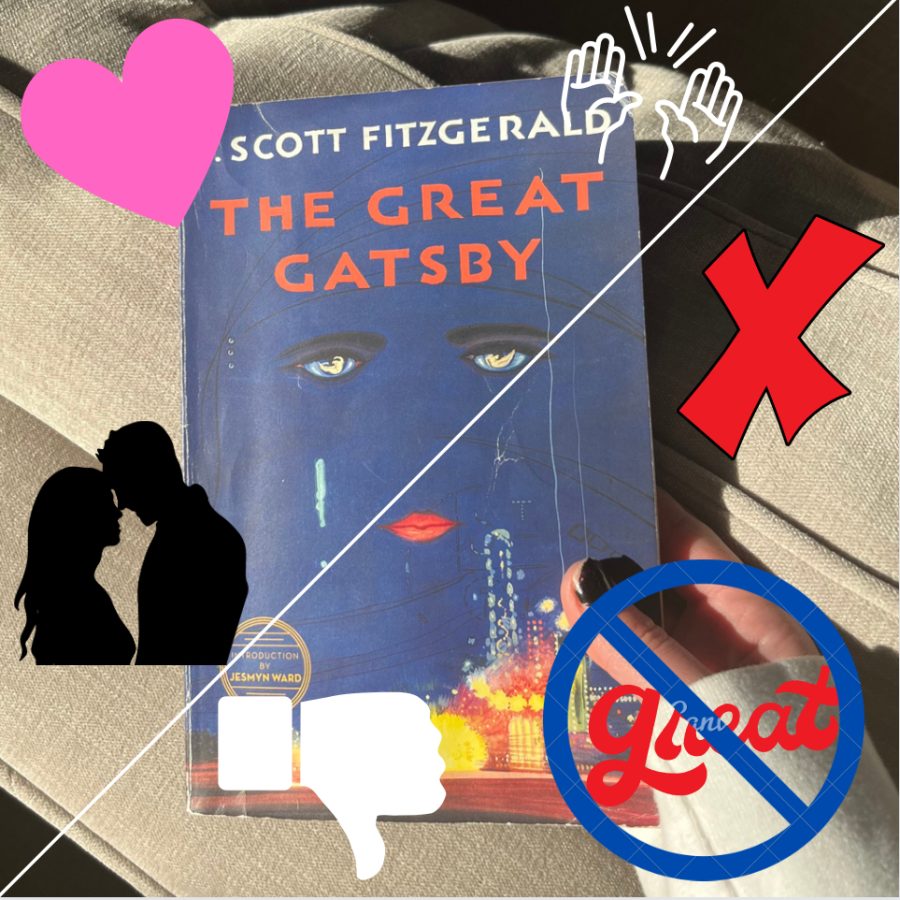Does The Great Gatsby Deserve Its Praise?
Do you think The Great Gatsby by F. Scott Fitzgerald deserves its praise?
There are many valid critics of The Great Gatsby-both negative and positive!
Currently, many junior English classes are reading The Great Gatsby by F. Scott Fitzgerald. The story’s narrator is Nick Caraway, neighbor to the elusive and mysterious Gatsby: the “Great” Gatsby. Published in 1925, the novel is set during the post-World War 1 period, otherwise known as the roaring 20’s.
No book is universally loved, and The Great Gatsby is no exception. There are many positives and negatives that readers have found within the novel, and both sides are valid.
Pros
A big misconception in the literature world is that readers must like the characters for a book to be good. If the author has the skills to make you so angry over your least favorite character, they are most likely doing an excellent job. Regarding The Great Gatsby, many readers have issues with Daisy specifically. However, it was intended to make Daisy a complex and frankly aloof character. It makes Gatsby’s yearning and love for her all the more frustrating since Daisy isn’t that great of a person. On the other end of the spectrum, narrator Nick Caraway is universally liked (or tolerated). He gives the reader a glimpse into the life of Gatsby and his commentary on each situation is always fascinating to read about.
A major theme of the novel is the “American Dream” and the failure of it. This is expressed through Gatsby’s desire to be with Daisy; Gatsby does everything in his power to enhance his chances of being with Daisy (gain a fortune, move next door, etc.). This theme further critiques the corruption of the American dream. Money can’t buy everything, and sometimes that can be very hard to hear. During Gatsby’s illustrious parties we see the superficiality of many of his guests. They critique Gatsby relentlessly, yet make great use of his liquor and mansion.
The writing in the book is grand and marvelous, especially when describing Gatsby’s epic and rich parties. Nick goes to his first party of his in chapter three, and the opening paragraph reads: “There was music from my neighbor’s house through the summer nights. In his blue gardens men and girls came and went like moths among the whisperings and the champagne and the stars. At high tide in the afternoon I watched his guests diving from the tower of his raft or taking the sun on the hot sand of his beach while his two motor boats slit the waters of the Sound, drawing aquaplanes over cataracts of foam.” The metaphorical language combined with the lavish activities his guests partake in makes us want to jump right into the novel.
Speaking of metaphorical language, Fitzgerald incorporated many symbols and motifs into his book. One example is Dr. T. J. Eckleberg’s eyes, which stare down the residents of West Egg. They represent both a judgeful watcher of this post-war America, and remnants of the past when the town was just a barren wasteland.
While there are differing opinions on Daisy and Gatsby’s love (is it true love or mere pretense?), it is hard to argue with the fact that it is an extremely well developed romance. Gatsby’s backstory is slowly fed to the reader and by the end of the novel, we learn why Gatsby became the man he is. It was all for Daisy. Their relationship and feelings towards one another takes center stage in chapter 7. No spoilers for the chapter, but prepare to be on the edge of your seat the entire time.
Lastly, despite the chapters being lengthy, the entire book comes under 200 pages. With students’ busy schedule, it isn’t too difficult to squeeze in one or two chapters of the novel each night.
Cons
The plot in The Great Gatsby is confusing because it is not clear whether there even is one.
When someone asks what Gatsby is about, it is hard to give a direct answer. With the way this novel is written, every plot seems to be a subplot. It is hard to know which to grab onto when so much is going on. One could say that Fitzgerald is describing the lives of rich people in the ‘20s, but what else?
Nick Caraway is the book’s narrator, so it would make sense if he was involved in the central plot, though this is not the case. The book is often advertised as a love story between Daisy and Gatsby instead. While their love story is a present theme and issue in the novel, it does not take the role as the central plot. Their love story, or lack thereof, is categorized as the central plot because readers tend to grasp onto romantic storylines when presented. However, this does not mean it is the plot.
On top of the already complex Gatsby and Daisy, there is Nick and Jordan’s love story, Tom and Daisy’s marriage, Tom and Myrtle’s affair, Gatsby’s parties- the list goes on. Everything and anything is happening all at the same time, so when something major happens it feels out of the blue or out of place. It’s almost as if Fitzgerald was trying to create controlled chaos, which can be successful, but not in this novel. As a result, the plot of Gatsby becomes confusing and unclear.
Many Jewish students ran into some issues with The Great Gatsby when reading the characterization of Meyer Wolfsheim.
Wolfsheim is a “mobster” known for helping Gatsby in his illegal bootlegging, and he is Jewish. The fact that he is written as a money-hungry criminal feeds into the Jewish stereotypes that involve being deceitful for money. One major stereotype, very much highlighted about Wolfsheim, is his nose.
“A small, flat-nosed Jew raised his large head and regarded me with two fine growths of hair which luxuriated in either nostril.” “…he dropped my hand and covered Gatsby with his expressive nose.” “As he shook hands and turned away his tragic nose was trembling.” These three quotes are found within just a few pages, and this is the first chapter in which you meet Wolfsheim!
A common stereotype used against Jewish people is the idea that they have big noses. It is very clear that Fitzgerald fed into this while creating Wolfsheim’s character. While it is understood that due to the novel’s time of publication, antisemitism was much more normalized, this doesn’t change the blatant fact that Wolfsheim’s character is a Jewish stereotype on paper. The Great Gatsby is being taught in schools, so this antisemitism should not go unnoticed. If this novel must be in the curriculum, teachers should acknowledge this characterization. If it is brushed over, it could lead to the understanding that these stereotypes are acceptable. It’s impossible to change the way the book was written, but it is possible to teach it the right way.
There are many characters in The Great Gatsby, and pretty much all of them are unlikeable. While it is definitely possible to read and enjoy a good book and not love all the characters, it is hard to fall in love with a novel in which you hate everyone; there is no one to root for.
This is not a dig at Fitzgerald’s characterization, since his intention very well could have been writing extremely flawed characters. However, if every turn of the page fills the reader with undeniable rage, it’s impossible to enjoy the novel.
The Great Gatsby is meant to provide a political statement about the rich during the ‘20s, something applicable to life today. It is a story of money, greed, and the evils of humanity. However, this theme is lost within all of the other issues the novel presents. It is hard to walk away from Gatsby learning an important moral when it is impossible to walk away with an understanding of a plot. If this novel was more focused, there could’ve been a wonderful lesson learned about how far people will go for money and what they want. Readers would walk away questioning themselves and their own greed, pride, and lust. No one should have to dig to find this moral.
Although the book itself might be short, the chapters are long and drawn out, each filled with huge amounts of information. Missing one page or word will throw a reader off. With Fitzgerald’s confusingly detailed writing, it is almost impossible to take everything in after reading one chapter.
Gatsby Wrap-up
Despite any opinions or thoughts on the novel, The Great Gatsby is undeniably a classic that is read by many around the world. It’s required in almost all English curriculums in the United States, and with Leonardo DiCaprio as Jay Gatsby in the 2013 remake, the book is still topical today. Now, we leave you with one question: do you think The Great Gatsby by F. Scott Fitzgerald deserves its praise?




